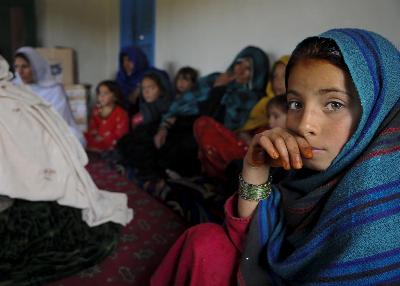Share
Human Rights Voices
While the UN devotes its human rights operations to the demonization of the democratic state of Israel above all others and condemns the United States more often than the vast majority of non-democracies around the world, the voices of real victims around the world must be heard.
Afghanistan, August 31, 2023
‘Illogical And Inhumane’: Taliban’s Ban On Women Entering National Park Sparks Widespread Anger
Original source
Thousands of families flock every year to the crystal-blue lakes and soaring cliffs in Band-e Amir, one of the most popular national parks in Afghanistan.
Among them was the family of Zahra Qumbri, a young woman who lives in the central province of Bamiyan, where the park is located.
But Qumbri can no longer visit after the Taliban on August 26 banned all women from entering Band-e Amir, in a move that has triggered widespread condemnation.
"This is a cruel act that is both illogical and inhumane," Qumbri told RFE/RL's Radio Azadi. "In the past two years, women have been removed from all cultural, economic, and political activities."
The ban is seen as the latest attempt to erase Afghan women from public life. Since seizing power in 2021, the Taliban has banned women from education and most forms of employment and imposed strict limitations on their freedom of movement and appearances.
"We are virtually under house arrest," Qumbri said. "They are gradually increasing and tightening restrictions against Afghan women.
They are burying us alive."
'Hijab Just An Excuse'
The ban came into effect shortly after Mohammad Khalid Hanafi, the Taliban's minister for the promotion of virtue and the prevention of vice, claimed that women visiting Band-e Amir were not wearing the mandatory hijab, or Islamic head scarf, properly.
"Going sightseeing is not a must for women," said Hanafi, who ordered Taliban fighters to prevent any women from entering the park.
Gul Bakht Nejati, a woman who lives in Bamiyan, said Taliban fighters were preventing some women from entering Band-e Amir even before the ban was announced.
"Everyone going there was being questioned," she said, adding that women were ordered to prove their relationship with the men accompanying them. "If you are accompanying your husband, you must carry your marriage certificate because the Taliban will always question you."
Taranum Saeedi, an Afghan women's rights activist, says the Taliban is using women's alleged violations of the hijab requirement as an excuse to further diminish their access to public places. In the past year, the Taliban has also banned women from using gyms and visiting public bathhouses and city parks.
"Afghan women have always worn the Islamic hijab," Saeedi told Radio Azadi. "But the Taliban is a misogynistic and oppressive group."
More Suffering
The Taliban ban is likely to see a significant drop in the number of people visiting Band-e Amir, a top tourist destination in Afghanistan. Local business owners who depend on tourism fear their livelihoods will suffer.
"Our shops will now have to be closed," a woman who owns a shop near one of the six lakes in the national park told Radio Azadi. She spoke on condition of anonymity for security reasons.
In 2009, Band-e Amir became Afghanistan's first official national park. Four years later, several female rangers were employed in the park, in a first for the country. The number of local tourists visiting the park was steadily growing until the Taliban takeover.
"This is just cruel," Hogai Amil, an Afghan writer and women's rights activist, told Radio Azadi. "This is a betrayal of our culture and human values."

